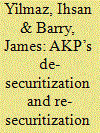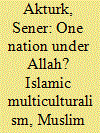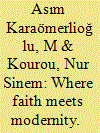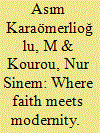|
|
|
Sort Order |
|
|
|
Items / Page
|
|
|
|
|
|
|
| Srl | Item |
| 1 |
ID:
171944


|
|
|
|
|
| Summary/Abstract |
This article evaluates the Turkish state’s relations with the Alevi community through a securitization theory framework. It first examines the issue in its historical context, comparing Kemalist and more recent policies, and highlights that despite the ideological differences between the previous governments and the current AKP government, for Alevis much has remained the same. It then turns to the securitization of the Alevis by successive regimes, and demonstrates that the period of de-securitization begun under the AKP did not end the practice, and that political expedience led to the issue’s re-securitization.
|
|
|
|
|
|
|
|
|
|
|
|
|
|
|
|
| 2 |
ID:
160435


|
|
|
|
|
| Summary/Abstract |
A number of reforms and initiatives, undertaken by the Justice and Development Party (AKP or AK Party) governments in Turkey, widely known as Kurdish and Alevi ‘openings,’ and the less prominent non-Muslim (primarily Armenian and Jewish) openings, have puzzled scholars as to their causes, consequences, and limitations. In this article, I first briefly review four different kinds of analytical accounts that seek to explain the AK Party’s openings. Second, I introduce my argument that an Islamic conceptualization of a new religious-national identity is both the main motivation and the main limitation of these reformist initiatives. Third, I provide an analysis of critical speeches, official statements, and declarations by AK Party leaders, in particular by Recep Tayyip Erdoğan, on the Kurdish, Alevi, and non-Muslim openings, demonstrating that they invoke overwhelmingly religious justifications.
|
|
|
|
|
|
|
|
|
|
|
|
|
|
|
|
| 3 |
ID:
177269


|
|
|
|
|
| Summary/Abstract |
This article intends to shed light on the local politics of the Alevis by focusing on three different cemevis in Istanbul’s Gazi neighborhood. Based on a field study in the neighborhood between 2014 and 2015 and eventually revisiting it in 2019, we analyze the local political dynamics with regard to different cemevis. By so doing, we aim to acknowledge and underline two phenomena: the dialectical tension between faith and modernity as well as the fragmented nature of the Alevi identity. The latter task is crucial since most recent studies concerning Alevis have focused on their so-called ‘awakening’ or the ‘discovery’ of their identity. We look at the other side of the coin as well, namely the fragmentation of Alevi identity that has also been under way in recent decades. By this means, we hope to contribute to the literature on contemporary Alevi identity and politics.
|
|
|
|
|
|
|
|
|
|
|
|
|
|
|
|
| 4 |
ID:
180292


|
|
|
|
|
| Summary/Abstract |
This article intends to shed light on the local politics of the Alevis by focusing on three different cemevis in Istanbul’s Gazi neighborhood. Based on a field study in the neighborhood between 2014 and 2015 and eventually revisiting it in 2019, we analyze the local political dynamics with regard to different cemevis. By so doing, we aim to acknowledge and underline two phenomena: the dialectical tension between faith and modernity as well as the fragmented nature of the Alevi identity. The latter task is crucial since most recent studies concerning Alevis have focused on their so-called ‘awakening’ or the ‘discovery’ of their identity. We look at the other side of the coin as well, namely the fragmentation of Alevi identity that has also been under way in recent decades. By this means, we hope to contribute to the literature on contemporary Alevi identity and politics.
|
|
|
|
|
|
|
|
|
|
|
|
|
|
|
|
|
|
|
|
|